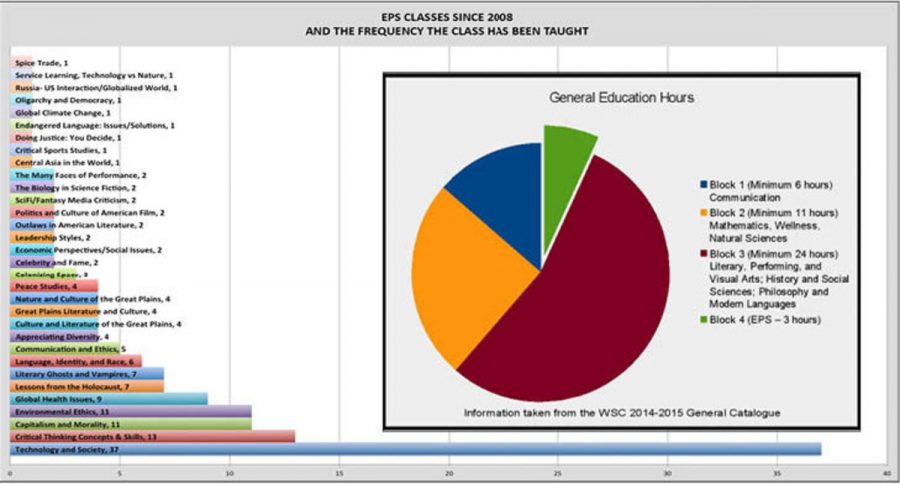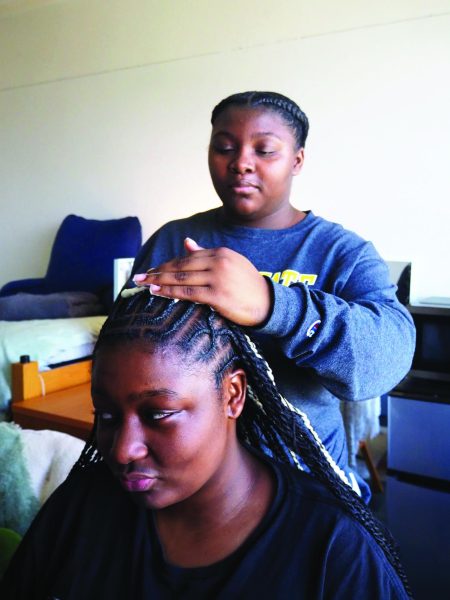EPS courses may be on the chopping block
Proposal would eliminate class ‘to get students out of their buildings’
November 19, 2014
In 2008, the Educated Perspective Seminar (EPS 300) was implemented. It was developed to serve as a capstone to the general education program and, eventually, to evaluate Wayne State’s general education classes.
Earlier this month, a proposal to end EPS 300 was brought to the General Education Committee meeting.
Dr. Michael Anderson, Vice President of Academic Affairs, created the proposal to do away with EPS 300, effectively cutting three hours from students’ general education requirement, making it 41 hours as opposed to the current 44-hour program.
For Anderson, the purpose of the proposal boils down to two issues: assessment and resources.
In the proposal, Anderson stated that the EPS program comes with considerable costs and fails to serve as the assessment tool it was meant to be.
“The course was meant to be a capstone class where you bring all of your courses from gen ed together,” Anderson said. “The General Education Committee decided to use the class as a way to assess the gen ed program, but it’s never been done. It costs money and time to gather the data and it has never been used to make a change.”
He also said that by cutting EPS 300 classes, instructors would have more classroom time available.
Reaction from the WSC faculty includes surprise, trepidation and, in many cases, cautious support.
Even if the EPS program isn’t successfully assessing the entirety of the general education program, some professors still see it as a benefit to students.
“One thing students get out of it is the opportunity to think about a big idea that we can’t pigeonhole into one discipline,” Dr. Tami Worner, Physical Science and Mathematics department chair, said. “It stops students from just learning content and memorizing information. It’s a course about ideas and thinking and not regurgitating facts.”
Creating a final multidisciplinary general education class was meant to do more than just make students think about big ideas. EPS 300 is also a chance for students with different majors to learn together when they otherwise might not share classes.
“The philosophy is sound. We want students to leave here well rounded. It’s important to expose them and to get them out of their buildings,” Dr. Mark Leeper said.
Even with the good intentions behind the class, there are some undeniable flaws, especially with using the EPS program as an assessment tool.
Prior to the current EPS 300 program, WSC students needed two capstone classes. In 2008, that was cut down to one class.
“The question is, how do you assess gen ed at the end when no one is in the same class,” Worner said. “The original purpose was not to be an assessment tool for the program.”
Some faculty have suggested that turning EPS into an evaluation tool was done too quickly and that’s why it hasn’t been a smooth transition from its original purpose.
“We really haven’t dug into gen ed assessment. In terms of assessment, EPS is not doing what we want it to do,” Dr. Charles Parker, Business and Economics department chair, said.
As well as getting rid of a potentially ineffective program, ending EPS 300 could benefit both faculty and students, according to some sources.
By cutting this one class, professors could see a three to four-hour opening in the amount of hours they’re able to teach per semester.
Currently, faculty can teach only 12 hours per semester unless they are teaching an overload.
“Many faculty feel they can’t take the time out of what they regularly offer to do a free standing class,” Leeper said.
With hours limited, teaching EPS or teaching something within a specific department becomes a question of allocating resources.
“Some program areas need more faculty, but the state of Nebraska isn’t going to give more money for that. If the faculty don’t have to teach EPS, maybe they would be able to shift time,” Parker said.
This another major benefit that Anderson sees as well.
“Last year, students spent roughly 1,800 credit hours on EPS 300. For faculty, that’s equivalent to four new faculty members,” Anderson said.
There is also an issue of EPS classes getting canceled because not enough students sign up for one particular class.
Students still need the same number (40 hours) of upper-division classes to graduate.
Anderson and some faculty believe that pulling resources away from EPS 300 and putting them towards classes that students will fill and more directly corresponds to upper-division classes is a more efficient use of those resources.
Students could also potentially benefit from cutting the final three hours from their general education.
For students transferring to WSC, cutting EPS 300 means that if they’ve taken all of their gen eds at another institution, there is one less class they have to take here.
Some believe the capstone class may be a deterrent for choosing Wayne State if transfers believe they have yet another class they have to take outside their major.
Another argument is that cutting the course could give students more freedom to focus their studies.
“This could benefit students in that it frees up three hours. Maybe students could do a double major or minor. Maybe there are students that aren’t getting extra endorsements,” Parker said. “Less gen ed means more focus on students’ main interests.”
Even with the potential benefits, one question still remains. Is getting rid of the entire EPS program a good idea as opposed to revamping it?
“I recognize that not all students have a great experience in their EPS classes, but that’s not a good reason to get rid of them. Not all students have a great experience in math classes, but that doesn’t mean you stop teaching math,” Worner said. “Students get to have a unique experience with a faculty member and a small group. It’s a real benefit for students to have that opportunity.”
At the end of the day, it’s important to remember that the fate of EPS is still undecided. Though Anderson has the power to get rid of the class, he hasn’t.
“It’s about transparent decision-making. This decision is important and I want to hear what the faculty thinks and I want to hear what students think,” Anderson said.









